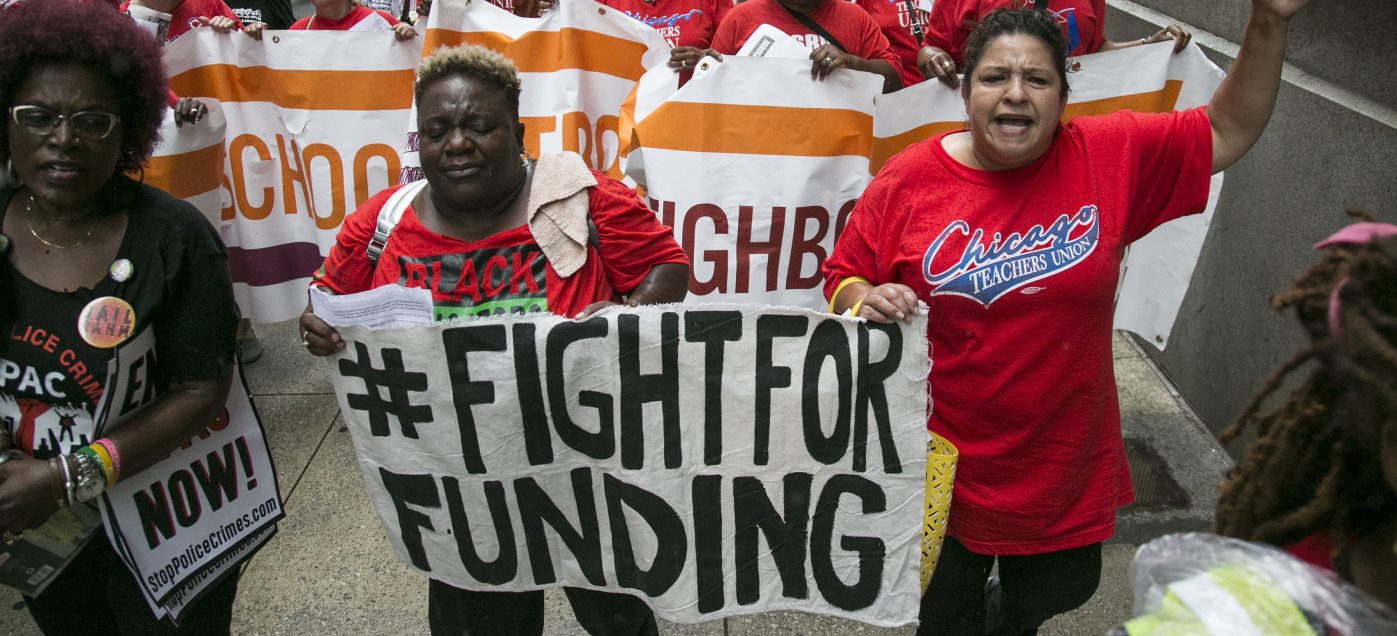(CTU plans May Day rally calling for more school funding. (2017, April 28). Chicago Sun Times. Retrieved May 17, 2018, from https://chicago.suntimes.com/news/ctu-plans-may-day-rally-calling-for-more-school-funding/)
The current problem we face is that the Trump administration does not believe that an increased investment in education will help solve these problems; instead, as Alyson Klein discusses, Betsy DeVos wants to expand school choice initiatives as a means to improve education, but Barbara Michelman explains how these sorts of voucher systems for school choice will in fact ultimately harm our public schools as they will end in more public schools lacking more funding that they desperately need (Klein, 2018; Michelman, 2017). Klein is a “a reporter for Education Week who covers the Trump administration’s K-12 policy;” she explains how DeVos plans to, “give applicants for federal grants a leg-up if they are planning to embrace things like school choice” (Experts, 2018; Klein, 2018). Klein reports on how the National Coalition for Public Education is actively opposing this initiative of school choice because it will necessarily, in the organization’s own words, “fail to improve academic achievement, undermine public education funding, harm religious freedom and lack critical accountability for taxpayers” (Klein, 2018).
Michelman is a “freelance education writer and consultant” who echoes these concerns and explains how school choice will lead to two critical problems: worse academic achievement by students and lack of adequate resources for poor performing schools (Michelman, 2017). Michelman explains how students who use voucher programs produce worse results in math and reading in comparison to peer public school students in Washington D.C. (Michelman, 2017). Secondly, she explains how, when a student leaves a public school through school choice, with that voucher they are directly taking away funding from the public school, yet, the school’s costs remain the same; the school still needs to pay its teachers, for example (Michelman, 2017). In other words, the amount of money the school has to pay off its costs decreases while its costs stay the same; therefore, this makes it even more difficult for schools that are already failing to try and succeed (Michelman, 2017). She also explains how some congressional representatives are trying to turn funding for Title I into vouchers; however, this is dangerous because Title I funding is supposed to go to schools that are lacking funding, and students who now have vouchers will most likely try to not go to those struggling schools, which will leave those schools without the money they need (Michelman, 2017).
Both authors express either their own or others’ concerns with this shift to a school choice model; the general problem at the root of all these concerns, however, is that, as Rucker Johnson’s article shows, funding can lead to educational benefit and these schools who serve poor students especially need funding; yet, if we allow students to leave these schools and take the funding with them, these public schools will fail as a result (Michelman, 2017; Klein, 2018; Johnson, 2015).
References
Experts. (n.d.). Retrieved May 17, 2018, from Editorial Projects in Education, Education Week website, https://www.edweek.org/info/about/experts.html#klein.
Johnson, Rucker C. (2015). Follow the Money: School Spending from Title I to Adult Earnings. RSF: The Russell Sage Foundation Journal of the Social Sciences, Vol. 1, No. 3, The Elementary and Secondary Education Act at Fifty and Beyond. 50-76. Retrieved from http://www.jstor.org/stable/pdf/10.7758/rsf.2015.1.3.03.pdf?refreqid=excelsior%3A04a485e259336f5f79c280b3a3732582.
Klein, A. (2018, February 28). Betsy DeVos Wants to Direct Federal Funds to School choice,STEM, Workforce Readiness. Education Week. Retrieved from http://blogs.edweek.org/edweek/campaign-k-12/2018/02/betsy_devos_competitive_grant_priorities_choice_final.html?qs=devos+funding.
Michelman, B. (2017). Vouchers, School Privatization, and the Threat to Public Education. Policy Priorities: An Information Brief from ASCD Volume 23. 1-7. Retrieved from http://www.ascd.org/publications/newsletters/policy-priorities/vol23/num03/Vouchers,-School-Privatization,-and-the-Threat-to-Public-Education.aspx.
